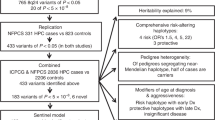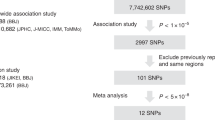Abstract
We conducted a genome-wide SNP association study on prostate cancer on over 23,000 Icelanders, followed by a replication study including over 15,500 individuals from Europe and the United States. Two newly identified variants were shown to be associated with prostate cancer: rs5945572 on Xp11.22 and rs721048 on 2p15 (odds ratios (OR) = 1.23 and 1.15; P = 3.9 × 10−13 and 7.7 × 10−9, respectively). The 2p15 variant shows a significantly stronger association with more aggressive, rather than less aggressive, forms of the disease.
This is a preview of subscription content, access via your institution
Access options
Subscribe to this journal
Receive 12 print issues and online access
$209.00 per year
only $17.42 per issue
Buy this article
- Purchase on Springer Link
- Instant access to full article PDF
Prices may be subject to local taxes which are calculated during checkout
Similar content being viewed by others
References
Gudmundsson, J. et al. Nat. Genet. 39, 631–637 (2007).
Gudmundsson, J. et al. Nat. Genet. 39, 977–983 (2007).
Narod, S.A. et al. Nat. Med. 1, 99–101 (1995).
Monroe, K.R. et al. Nat. Med. 1, 827–829 (1995).
Yeager, M. et al. Nat. Genet. 39, 645–649 (2007).
Guilherme, A. et al. J. Biol. Chem. 279, 10593–10605 (2004).
Salehi, A.H., Xanthoudakis, S. & Barker, P.A. J. Biol. Chem. 277, 48043–48050 (2002).
Salehi, A.H. et al. Neuron 27, 279–288 (2000).
Hidaka, K. et al. J. Biol. Chem. 277, 32730–32738 (2002).
Dubois, E. et al. J. Biol. Chem. 277, 23755–23763 (2002).
Morrison, B.H., Bauer, J.A., Kalvakolanu, D.V. & Lindner, D.J. J. Biol. Chem. 276, 24965–24970 (2001).
Amundadottir, L.T. et al. Nat. Genet. 38, 652–658 (2006).
Haiman, C.A. et al. Nat. Genet. 39, 638–644 (2007).
Acknowledgements
We thank the individuals who participated in the study and whose contribution made this work possible. This project was funded in part by contract number 018827 (Polygene) from the 6th Framework Program of the EU to deCODE genetics, T.R. and L.A.K. The study was supported in part by National Cancer Institute CA105055, CA106523 and CA95052 to J.X., CA112517 and CA58236 to W.B.I., CA86323 to A.W.P., and Department of Defense grant PC051264 to J.X., and in part by a V Foundation award and US Department of Veterans Affairs grants to J.R.S. The principal investigators and corresponding authors for the respective replication study populations are L.A.K. (The Netherlands), J.I.M. (Spain), H.G. (Sweden), W.B.I. (Baltimore), W.J.C. (Chicago), J.R.S. (Nashville) and S.N.T. (Rochester).
Author information
Authors and Affiliations
Corresponding authors
Ethics declarations
Competing interests
The authors from deCODE genetics are share holders in deCODE genetics Inc.
Supplementary information
Supplementary Text and Figures
Supplementary Methods, Supplementary Tables 1–5 (PDF 182 kb)
Rights and permissions
About this article
Cite this article
Gudmundsson, J., Sulem, P., Rafnar, T. et al. Common sequence variants on 2p15 and Xp11.22 confer susceptibility to prostate cancer. Nat Genet 40, 281–283 (2008). https://doi.org/10.1038/ng.89
Received:
Accepted:
Published:
Issue Date:
DOI: https://doi.org/10.1038/ng.89
This article is cited by
-
Androgen receptor binding sites enabling genetic prediction of mortality due to prostate cancer in cancer-free subjects
Nature Communications (2023)
-
Characterizing prostate cancer risk through multi-ancestry genome-wide discovery of 187 novel risk variants
Nature Genetics (2023)
-
Prostate cancer risk variants of the HOXB genetic locus
Scientific Reports (2021)
-
Association study between common variations in some candidate genes and prostate adenocarcinoma predisposition through multi-stage approach in Iranian population
BMC Medical Genetics (2020)
-
The mechanism of activation of the actin binding protein EHBP1 by Rab8 family members
Nature Communications (2020)



